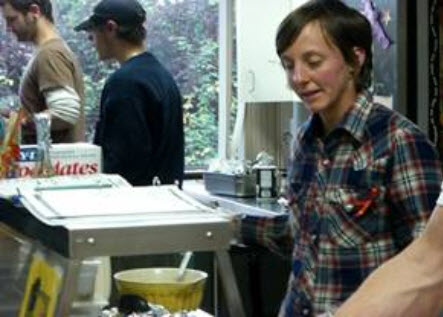Community Youth Services
Olympia, Wash.
(360) 943-0780
http://www.communityyouthservices.org/p_rosies_place.shtml
|
|
| Out-of-the-box lunch: Staffers serve a hot meal daily to the homeless youth who drop in. |
Objective: To provide a warm, safe place for homeless and at-risk youths, to help them identify their strengths, and to empower and support them as they work toward self-identified goals.
In a Nutshell: Rosie’s Place is one of nearly 20 programs offered by Community Youth Services (CYS), a nonprofit social service agency that serves an estimated 4,000 children, youth and families in the South Sound region of Washington each year.
Each week (excluding Thursdays and weekends) from 8 a.m. to noon, Rosie’s Place provides a self-serve breakfast and a hot lunch, as well as access to a music room, library, computers, art supplies, bicycle repair assistance, lockers, hygiene supplies, a phone and voice mail on a drop-in basis. From 1 to 4:30 p.m., youths can visit with case managers and outside service providers who offer health screenings, substance abuse counseling and personal development workshops.
Youth Served: The drop-in center each week serves between 30 and forty 13- to 21-year-olds, who are homeless or at risk of becoming homeless. Rosie’s Place prides itself on having low-barrier access; a youth needs only provide his or her first name, last initial and date of birth to enter the center and receive access to services.
Where it Happens: Rosie’s Place is in the CYS building in downtown Olympia, accessible by several local bus lines.
When it Began: CYS was founded in 1970. The drop-in center opened four years ago.
Who Started it and Who Runs It: CYS began a street outreach program in the early 1980s. When Olympia’s only drop-in center for homeless youth closed several years ago, displaced youth began hanging out at adult centers, where they were much more likely to be victimized. Perceiving an urgent need to separate the two populations, CYS pulled together funding to open Rosie’s Place; it also continues to run its street outreach program.
Three full-time staff members with bachelor’s degrees and one Americorps volunteer coordinator run the drop-in center. They are supervised by a master’s-level program director, who also supervises the street outreach and suicide prevention programs. Rosie’s Place has 11 part-time volunteers who serve lunch, conduct art projects, maintain the clothing closet, organize donations, facilitate groups and mentor youths. In addition, youths often help with daily duties and regularly volunteer to do outside projects that support the program.
Overcoming Obstacles: “The biggest challenge we faced concerned the safety and rules of the space,” said Rosie’s Place Project Director Tasha Church. From the beginning, the center has used a Positive Youth Development model that steers youths toward making their own rules for the space. As a result, the youths manage themselves and encourage others to do the same.
Cost: The current annual budget is $350,000.
Who Pays: The center receives federal, state and local funding. Local community organizations and individuals regularly donate both money and in-kind services. In addition, volunteers organize several fundraisers each year for CYS, from which Rosie’s Place receives a substantial portion of the proceeds.
Youth Turn-On: “The youth truly feel that the drop-in center is their space and feel a sense of ownership,” Church said. “We work at their speed and allow them to identify the changes that they want to see in their life.”
Youth Turn-Off: “The youth would really like to see a [low-barrier] shelter program attached to our services,” Church said. “It’s a gap in our services.”
Research Shows: Church said the center’s need to remain a low-barrier program makes it difficult to quantify its outcomes. No formal evaluation of the center has been conducted.
To meet funding requirements, Rosie’s Place enters anonymous data on the number of youths it serves and the services it provides into the U.S. Family and Youth Services Bureau’s Runaway and Homeless Youth Management Information System (RHYMIS) – an online database that captures information from federal Basic Center Program, Transitional Living Program and Street Outreach Program grantees.
What Still Gets in the Way: “We are always struggling with funding and wanting to provide more to the youth we serve,” Church said.
Contact: Tasha Church, program director, (360) 943-0780 ext. 135, http://www.communityyouthservices.org.



























